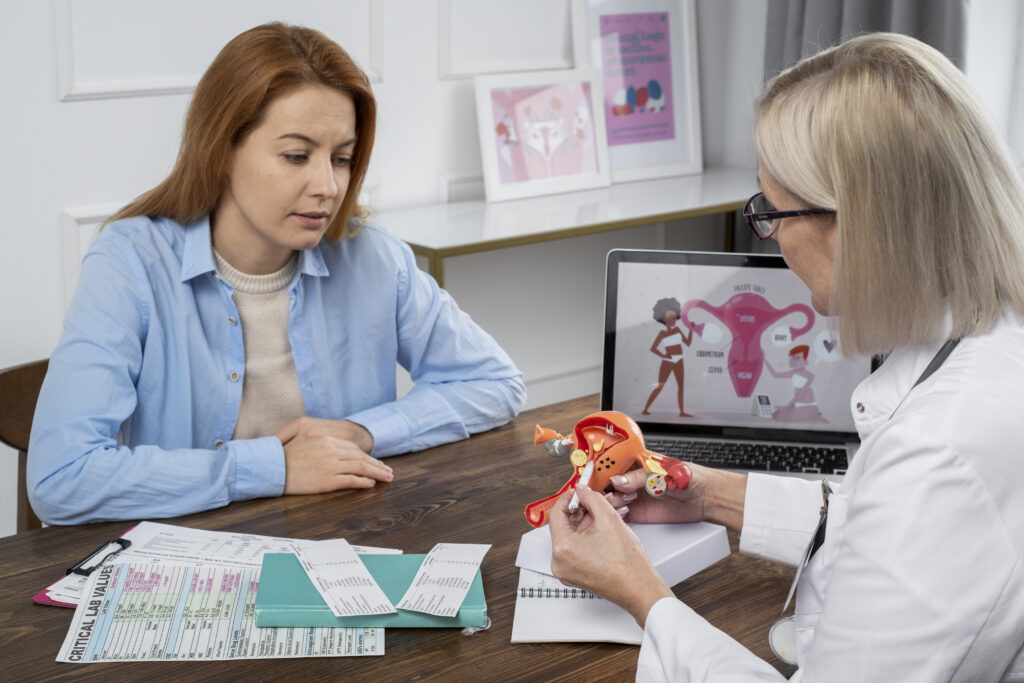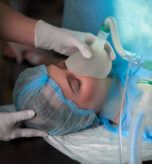Understanding Uterine Fibroids: Symptoms, Causes, and the Latest Treatments

WHAT ARE FIBROIDS?
Fibroids are non-cancerous growths that form in or around the uterus. These are made up of muscle and connective tissue and may vary in size—from tiny nodules to large masses. While fibroids are not life-threatening, they can affect a woman’s quality of life by causing pain, heavy menstrual bleeding, and other complications. At Dev Hospitals, we help patients identify and manage fibroids with advanced diagnostics and personalized care.
HOW TO IDENTIFY FIBROIDS?
Fibroids often develop silently, and many women may not even know they have them. However, early signs such as heavy menstrual bleeding, prolonged periods, pelvic pain, frequent urination, or a feeling of fullness in the lower abdomen should not be ignored. Diagnosis typically involves a pelvic examination, ultrasound, or MRI scan to confirm the presence, size, and location of fibroids.
IS THERE ANY CHANCE THAT FIBROIDS ARE PRESENT BESIDE THE UTERUS?
Yes. While fibroids commonly grow within the uterus, they can also appear on the outer wall (subserosal), within the uterine wall (intramural), or inside the uterine cavity (submucosal). Some fibroids are pedunculated, meaning they are attached by a stalk and may even extend outside the uterus. Their location plays a crucial role in determining the type of symptoms and the treatment approach.
WHAT KIND OF SYMPTOMS DO FIBROIDS IN THE UTERUS CAUSE, AND HOW ARE THEY EVALUATED BASED ON THE LOCATION?
Symptoms vary based on where the fibroids are located:
- Intramural fibroids (inside the uterine wall): cause heavy bleeding, pelvic pain, and pressure.
- Subserosal fibroids (outside the uterus): may lead to back pain or urinary issues due to pressure on nearby organs.
- Submucosal fibroids (inside the uterine cavity): typically result in excessive bleeding and fertility issues.
- Cervical or pedunculated fibroids can lead to pain during intercourse or visible bulges.
At Dev Hospitals, our specialists evaluate fibroids using high-precision imaging to recommend the best care plan.
CAN WE CONTROL FIBROIDS WITH MEDICATIONS?
Yes, in many cases, fibroids can be managed through medications, especially if they are small or the symptoms are mild. Hormonal therapies, such as birth control pills, GnRH agonists, or progesterone-releasing IUDs, may help in reducing bleeding, pain, and fibroid size. However, medications typically offer temporary relief and may not shrink fibroids permanently.
WHAT ARE THE TREATMENT OPTIONS FOR FIBROIDS?
At Dev Hospitals, we provide a wide range of advanced and personalized treatment options to manage fibroids effectively. The right choice depends on the size, location, symptoms, and your personal and reproductive goals.
- Watchful Waiting
For small or asymptomatic fibroids, no immediate treatment may be needed. Regular monitoring helps track their growth and any symptom development. - Medications
Hormonal therapies, including birth control pills, GnRH agonists, and progesterone-releasing IUDs, help control bleeding and pelvic pressure but do not eliminate fibroids. - Minimally Invasive Procedures
- Uterine Artery Embolization (UAE) / Fibroid Embolization
A non-surgical and advanced technique where the blood supply to the fibroids is blocked using tiny particles, causing them to shrink over time. This is ideal for women seeking uterus-preserving, quick-recovery options. - MRI-Guided Focused Ultrasound Surgery (FUS)
A high-intensity ultrasound treatment that targets and destroys fibroid tissue with no incisions.
- Uterine Artery Embolization (UAE) / Fibroid Embolization
- Myomectomy
A surgical procedure to remove fibroids while preserving the uterus—recommended for women who plan to become pregnant in the future. - Hysterectomy
Complete removal of the uterus, a permanent solution usually advised for women with severe symptoms who no longer wish to conceive.
At Dev Hospitals, our expert gynecology and interventional radiology teams collaborate to ensure that each patient receives the most effective and safe treatment based on their individual condition.
Frequently Asked Questions (FAQs) About Fibroids
Are fibroids cancerous?
No, fibroids are non-cancerous tumors and are rarely associated with cancer
What causes fibroids?
The exact cause is unknown, but hormonal changes and genetic factors are believed to play a role.
Can fibroids affect fertility?
Yes, especially submucosal fibroids that grow inside the uterine cavity may affect implantation or pregnancy.
Is fibroid embolization safe?
Yes, fibroid embolization is a safe and effective non-surgical procedure with minimal recovery time.
Will I need surgery for fibroids?
Not always. Many cases are managed with medications or minimally invasive treatments like fibroid embolization.
How long does recovery take after fibroid embolization?
Most patients recover within 1 to 2 weeks, much faster than traditional surgery.
Can fibroids grow back after treatment?
Yes, especially if you choose medical management or myomectomy. Hysterectomy is the only definitive cure.
When should I see a doctor for fibroids?
If you're experiencing heavy bleeding, pelvic pain, pressure symptoms, or fertility concerns, consult a specialist for evaluation.
Need help managing fibroids or seeking expert consultation on fibroid embolization?
📞 Call Dev Hospitals today at +91 7993914154 for safe, advanced, and compassionate care focused on your health and comfort.




